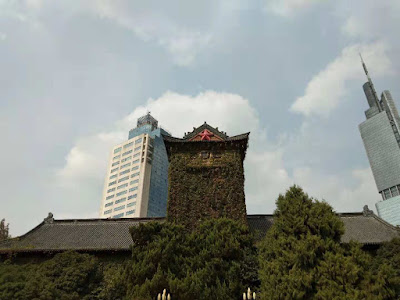Hi everyone!
I finally went to Disneyland Shanghai and am so excited to share my experience at the park with everyone. For those unaware, there is a Disneyland in China, and it is located just outside of Shanghai. It actually took about an hour and a half to get to the park from my university.
Compared to the other parks, Disneyland Shanghai is very small and tickets sell for about 390RMB for a single day, non-holiday and not a weekend. This is equivalent to approximately $60, so in that regard you're getting what you pay for. However, I want to point out that the price of the ticket changes drastically based on when you go, and for those hoping to go during the weekend, expect to pay 200RMB more and wait much longer. For this reason, I want to stress that if you have the opportunity, go during the week.
I'm very lucky to have gone on a day where the weather was fantastic (although air quality... not so much)! The longest I waited for a ride was only thirty minutes, and at that it was to ride the Seven Dwarf's Mine Train. Surprisingly, I was able to walk right onto both the Pirates of the Caribbean and Tron rides.
My experience at Disney was good, and I would recommend it to anyone who is a fan of the parks and of Disney. I found the park to be a little too small and too spread out. Overall I think there aren't more than 25-30 rides at the park, and many of them are tailored to the little children and aren't very intense. Now, I'm not asking Disney to create a park with high-intensity rides, but I felt that the Shanghai Disneyland was not at the same level as the park in Orlando, Florida. The rides were too fast and the wait was long, and had I gone on a weekend I know that I would have left feeling upset. In fact, besides Tron and the Mine Train, there are no other coasters at the park. Oh, and if you were expecting the Teacups ride, It's a Small World, or tower of terror, you can forget about those being there.
I'm not trying to criticize the park, but having gone from the American, original version to the Chinese version is a rough transition. Would I go back? Sure, but not on my own dime.
Going to Disneyland was a nice break from classes, and I am thankful that I went. I don't want to discourage anyone who is interested in visiting the Disneyland Shanghai, but keep in mind that you have to do a lot of walking for rides that are likely going to be shorter than the time you waited.
Furthermore, if you take anything from this post, I hope it's this: unlike the other parks, who highlight the princesses and what have you, Shanghai Disneyland does a fantastic job of incorporating Chinese culture into their rides and activities. For one, everything is in Chinese. If you don't understand at least some Mandarin, you're going to be encouraged to go somewhere else-- I say this because it happened to me. I was approached by a worker who told me that the Stitch movie was in all Chinese. To her surprise, I responded to her English with a simple, "That's fine" in Mandarin and she quickly nodded her head, letting me proceed. This won't happen a lot, but don't be surprised if a worker approaches you and warns you of the language barrier that could ensue. Shanghai Disneyland also features Chinese songs and dance, and from what I could see, places a lot of emphasis on Mulan. This is something very unique to Shanghai Disneyland, and I am glad to see that the park wasn't completely Westernized, at least in that sense.
All in all, I would encourage everyone to look into, but not feel obligated to go, to the park. I will say that there is a limit to how many tickets the park sells a day, so if you're planning your trip in advance either buy your ticket online through the Disney app or through DianPing, a Chinese app. My friends and I got our tickets electronically and it ended up working out best. No stress and we could walk right through to the park without waiting to buy a ticket!
What do you think? Have I convinced you to go, or are you still on the fence? Like always, leave a comment below letting me know your thoughts.












































